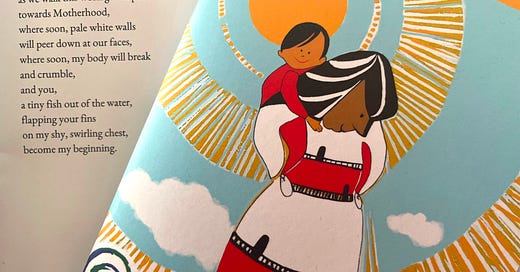Poems on birthing
Exploring Plath, Pastan, Olds, and Lowe, as well as my own poetry on child birthing
My poetry pamphlet, Mother Self, begins at that point of becoming - the moment of birth. In the foreword to my collection, my editor, Ellen Rowland, wrote: “Motherhood is ancient. Motherhood is ancestral. Motherhood is animal.” I extend this thought to birth itself - that raw, transformational space where body and time collapse into something that is both ancient and immediate.
I have written many different poems on that moment I became a mother. The poem below titled, ‘Becoming’ is my favourite, and the opening poem of my pamphlet. This is one of those poems that came to me, somehow, fully formed (I did do some edits later). I am proud of this poem, and often refer to it when I am looking for inspiration. I never thought of it, but my editor remarked how the image of the ‘fish’ evokes that sense of evolution.
In the 1978 piece, Exploring Childbirth in Literature, Carol H. Poston argues that birth is so rarely described in literature, and where such examples of birth are provided, Poston asks, “why is the experience so rarely that of the birthing woman; in other words, where is the authentic voice?” (Poston, 1978, p. 20).
Poetry on that very moment of birth remains yet to be fully explored, but in this post I share with you a few key works that brings forth that authentic voice of the birthing woman. These poems remind is that birth is labour, it’s upheaval, it’s strange, but that birth is also a reckoning, rooted in the body but also in the land, in time, in something beyond language; a space between pain and awe.
One of the first poems on motherhood that I was ever drawn to was Sylvia Plath’s Sylvia Plath’s Morning Song. The poem explores the raw emotions of that moment of becoming a mother and tending to a new born in the early days. I’ve attempted to do a close reading of the poem - I have always been in awe of this poem, and scribbling is the best way for me to express that:
The use of ‘watch’, ‘slapped’, and ‘elements’ gives a mechanical sense, and I am reminded here of Louise Gluck’s Mother and Child, were the poet says,
“Some machine made us; machine of the world, the constricting family.”
Linda Pastan’s Notes from the Delivery Room is another stunning poem. When the doctor asks the mother to “bear down”, this is seen as “work”. Here I’m reminded of what’s to come - how childcare is never considered as ‘work’ but rather as some form of ‘invisible labour’. I also love the imagery of birth as a vegetable process - how this moment of birth is so closely connected to that sense of earthiness.
“Babies should grow in fields;
common as beets or turnips
they should be picked and held
root end up, soil spilling
from between their toes—
and how much easier it would be later,
returning them to earth…”(From Linda Pastan’s Notes form the Delivery Room)
There is something raw about these lines, where in the moment of birth, the poet also thinks of ‘returning them to earth’.
Sharon Olds’ First Birth captures a similar ‘dangling’ sense, where the baby emerges with a sense of urgency,
“they held her up by a very small ankle,
she dangled indigo and scarlet, and spread
her arms out in this world…”
Olds begins her poem First Birth with the following lines:
“I had thought so little, really, of her,
inside me, all that time, not breathing–
intelligent, maybe curious…”
I had first thought of this as creating some form of detachment or distance, that it is some sort of admission. But I also think this may be because the being inside of the mother is very much part of the mother, and the mother and the unborn think as one rather than the mother thinking of the unborn as outside of her.
But whatever this unknowing, the ending of the poem with the line:
“I was nothing, no one, I was everything to her, I was hers.”
forms a sort of loop, like life itself. A new sense of belonging it established - without too much thinking really.
In the meantime, Hannah Lowe’s The Stork takes a different approach, using the age-old metaphor of the stork to craft a narrative about the weight of expectation and childbirth itself. Across cultures, the stork symbolises birth, renewal, and peace. But Lowe’s stork isn’t as gentle, rather it’s sharp-beaked and intrusive. Could it be a reminder that childbirth is never just personal, and of the pressures placed on mothers even before their child arrives?
These poems resonate strongly with me - they fill that void for the need for authentic voices of birthing mothers, and it ties us back to something ancient, something rooted deep in the earth.
What is a poem on birthing that has moved you recently?





